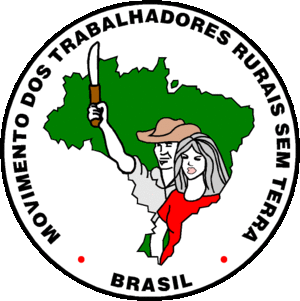About

The Brazilian Landless Workers Movement, or Movimento dos Trabalhadores Rurias Sem Terra (MST) in Portuguese, is a social movement dedicated to carrying out land reform to ensure more equality in land distribution. The estimated 1.5 million members have peacefully occupied unused land and established cooperative farms in Brazil. Once they establish a cooperative the organization helps build houses, schools and clinics. Throughout the process they promote indigenous cultures, gender equality and a sustainable environment. The organization has, and continues to, develop a “sustainable socio-economic model that offers a concrete alternative to today’s globalization.(1)”
The MST has achieved this through the organization and education of its members. They organize marches such as the National March for Employment, Justice, and Agrarian Reform in April 1997. They worked with the Brazilian Minister for the Environment to develop an Environmental Education program for leaders, teachers, and technical experts. They work with other countries to train teachers and Doctors, there are currently 48 MST members studying medicine at the Latin American School of Medicine in Cuba. There are also numerous members studying teaching in seven different universities across Brazil. In 1999 they began to introduce Bionatur, seeds produced without any pesticides or other chemicals while eliminating genetically modified crops from local fields.
International Affiliates:
The MST has also begun to work on an international scale to help others seeking an alternative to the FTAA (Federal Trade Area of the Americas) model in Latin America, Africa, Asia, and the Middle East. In 2002 they marched with 50,000 people during the World Social Forum along with Via Campesina (an international rural workers organization with a Brazil chapter). They have joined up with CLOC (Latin American Coordination of Rural Worker Organizations). In April of 2003 they sent soccer balls to children in Palestine as a show of solidarity.
The Brazil chapter of Via Campesina works closely with the MST as well. This organization is “an autonomous, pluralist movement, without political or economical ties of any type (2).” It originated in April 1992 when rural leaders from Central, North and South America and Europe came together in the context of the Congress of the National Union of Farmers and Ranchers (UNAG). The group’s focus is primarily food sovereignty, agrarian reform, external debt, technology, women’s participation and rural development.
They have many affiliates including National Family Farm Coalition (NFFC), Border Farm Workers Project - Proyecto de Trabajadores Agricolas Fronterizos and the Rural Coalition just in the United States, and more than 140 worldwide(3).
MST in the News:
For more information:
Contact the International Operative Secretariat (IOS) of Via Campesina at; +62-21-7991890
Jl. Mampang Prapatan XIV No. 5
Jakarta Selatan
DKI Jakarta
12790
Indonesia
For information in English about the MST or to get involed, email info@mstbrazil.org or write to:
FRIENDS OF THE MST
P.O. Box 478487
Chicago, IL 60647
Para informações em Português, vá para:
Movimento dos Trabalhadores Rurias Sem Terra, Contatos:
Jornal Sem Terra – jst@mst.org.br
Revista Sem Terra – revistasemterra@mst.org.br
Vozes da Terra – vozes@mst.org.br
Para información en Español vaya a:
CLOC o UNAG o Via Campesina
SOURCES:
1. Carter, Dr. Miguel. "Hisotry of the MST." MST. 02 12 2003. FRIENDS OF THE MST, Web. 18 Feb 2010. <http://www.mstbrazil.org/?q=history>.
2. Carter, Dr. Miguel. "Via Campensia." MST. 02 12 2003. FRIENDS OF THE MST, Web. 18 Feb 2010. <http://www.mstbrazil.org/?q=vaicampesina>.
3. "The International Peasant's Voice." What is La Via Campesina. 18 Feb 2010. La Via Campesina, Web. 21 Feb 2010. <http://viacampesina.org/en/index.php?option=com_content&view=frontpage&Itemid=1>.